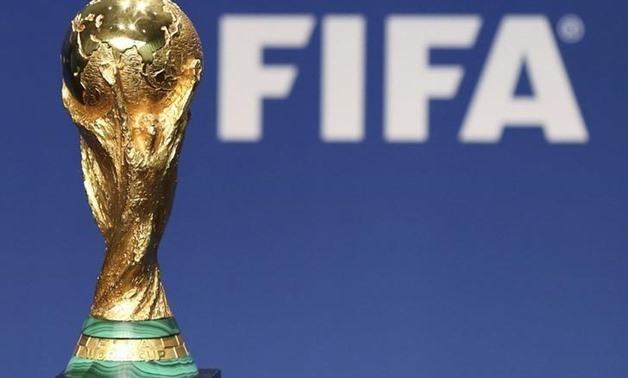
A replica of the FIFA Soccer World Cup Trophy pictured at the FIFA headquarters in Zurich on January 23, 2014. REUTERS/Thomas Hodel
CAIRO – 10 June 2018: The Egyptian Competition Authority (ECA) issued a statement Sunday addressing the Federation International of Football Association (FIFA). The statement stated that FIFA made an infringement of the Egyptian right to broadcast 22 games of the upcoming World Cup in Russia terrestrial channels.
The following is ECA’s official statement:
“The ECA has ordered interim measures against FIFA based on prima facie finding of infringements to articles 7 and 8 of the Egyptian competition law as it was revealed that those infringements would cause serious and irreparable damage to the freedom of competition and consumers, insofar they will prevent consumers from receiving the right to watch the 2018 World Cup Russia under competitive and fair conditions.
The FIFA must make available immediately to the Egyptian National Media Authority the rights to live broadcast through terrestrial channels 22 selected matches of the 2018 FIFA World Cup Russia.
On 14 May 2018, the ECA has received a complaint alleging that FIFA, the sole entity that owns the right to award licenses for TV broadcasting of the 2018 FIFA World Cup Russia, infringed articles 7 and 8 of the Egyptian competition law.
After conducting a preliminary inspection, it has been established, based on the available evidence, that FIFA extended its agreement with beIN Sports and awarded it on an exclusive basis all media rights pertaining to the 2018 FIFA World Cup Russia covering cable, satellite, terrestrial, mobile and broadband transmission across 23 territories and countries in the Middle East and North Africa including Egypt.
However, it was also revealed that these rights were awarded in absence of fair, or transparent or non-discriminatory tendering procedures. It has also been noted that granting the full range of rights as a single bundled package exclusively to one single entity for such an extended period of ti me is contrary to the FIFA's established practice in other countries and regions worldwide.
Moreover, the ECA noted that the FIFA contravened its own TV licensing policy, by virtue of which 22 matches must be made available on free-to-air terrestrial channels, that include all home team matches, the opening match, semi-finals and the final.
The ECA also noted that the practices of the FIFA in France, for example, were different from those in the Middle East and North Africa including Egypt. In France, the FIFA (after following an open tender) reached a deal with TF1 (the French terrestrial broadcaster) in 2016 that covers the 2018 and 2022 FIFA World Cups, with arrangements to show 28 of the biggest matches from those tournaments on a free-to air basis.
This deal did not obstruct the FIFA from reaching a separate deal with beIN sports in the same country that awarded the latter pay-tv rights of the two tournaments.
After reviewing the submitted evidence and conducting the relevant analysis, the ECA is of the position that the FIFA's practices in Egypt constitute a likely infringement to both articles 7 and 8 of the Egyptian competition law. Hence, the ECA, on 17 May 2018, sent a letter to the FIFA in order to make known its views on the complaint. As the FIFA did not provide any comments, the ECA, on 31 May 2018, notified FIFA of the initiation of an inspection regarding the allegations against it and requested its comments on the complaint as well as some documents pertaining to the alleged infringements. Nevertheless, the FIFA did not provide, again, the requested information within the time-limit.
In light of the urgency of the matter and its significant importance to the Egyptian viewers and market players, as well as the non-cooperation of the FIFA with the ECA's inspection, and having regard to article 20, paragraph 2, of the Egyptian competition law, as well as to the previous decision of the ECA, the precedents of the Egyptian's courts and the international best practices, the ECA's Board of Directors considered that the FIFA's practices constitute, on the basis of prima facie evidence, an infringement to articles 7 and 8 of the Egyptian competition law and that they will impose serious irreparable damage to the freedom of competition and to consumers insofar they will prevent consumers to receive the right to watch the aforementioned tournament under competitive and fair conditions.
Therefore, the ECA's Board of directors decided on 10 June 2018 to order interim measures against FIFA, whereby it shall make available immediately to the Egyptian National Media Authority, on reasonable financial terms, the rights to live broadcast in Egypt, through free-to-air terrestrial transmission, 22 matches of the 2018 FIFA World Cup Russia including, particularly, the Egyptian national football team matches, the opening match, three matches of the last 16 matches, the quarter-finals, the semi-finals and the final match of the tournament.
It is also worth mentioning that the practices of FIFA represent a likely infringement to article 34 of the Egypt-EU Association Agreement as welt as articles 16 and 18 of the Common Market for-Eastern and Southern Africa (COMESA) for inflicting a potential harm to the freedom of competition within the COMESA common market. Moreover, the Swiss Attorney General is undergoing a similar inspection regarding very similar practices, which represent likely infringements to the Swiss Federal Act on Unfair Competition, against the former and current management of FIFA.
Lastly, the ECA reminds the public and private entities in Egypt of their obligation to comply with the ECA's decision and their duty to facilitate the Egyptian National Media Authority's mission in obtaining all the rights as referred to in its decision. The non-cooperation of any of these entities subjects them to legal liability rules regarding this matter without prejudice to the civil liabilities arising from the non-implementation of the ECM decision.”


Comments
Leave a Comment